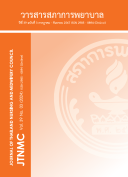Exploring Original Capital Supporting Ethnic Nursing Students in a Bachelor of Nursing Science Program: A Case Study of a Private Higher Education Institution
DOI:
https://doi.org/10.60099/jtnmc.v39i03.268073Keywords:
original capital, bachelor of nursing science program, ethnic nursing studentsAbstract
Introduction Ethnic nursing students, before entering the Bachelor of Nursing Science program, have original capital from their ethnic field including economic capital, social capital, cultural capital, and symbolic capital, supporting into professional nurses according to the standards and desired qualities of the nursing profession.
Objectives To explore the original capital supporting ethnic nursing students in a Bachelor of Nursing Science program at a private higher education institution.
Design This study employed critical ethnographic qualitative research.
Methodology The study context was within the nursing faculty of a private higher education institution. Participants were ethnic nursing students enrolled in a Bachelor of Nursing Science Program, ethnic professional nurses, and nursing instructors, selected based on predetermined criteria. Data were collected through in-depth interviews using semi – structured interview questions. Data were analyzed using thematic analysis and were validated following the Lincoln and Guba framework.
Results The participants were 1) ten fourth-year ethnic students in the Bachelor of Nursing Science program, 2) ten ethnic professional nurses who graduated no more than three years, and 3) five nursing instructors with at least five years of experience teaching ethnic nursing students. Three main themes emerged as original capital supporting the Bachelor of Nursing Science program were: 1) Capital acquired through ethnicity as capital acquired from birth, 2) Capital acquired psychological basis from the ethnographic field, and 3) Capital from the dynamics of faith culture.
Recommendation The results suggest criteria for considering scholarship assistance that cover rights and benefits for medical expenses in case of illness during studies or practical training, development of language skills for communication and understanding, especially medical terminology, and preparation for adaptation to social and cultural differences before entering the program.
Downloads
References
Kumpetch J, Phuthawan T, Takudruea W, Charoensuk C. Ethnic groups in Bangkok [master’s thesis]. Bangkok: Faculty of Social Sciences, Srinakharinwirot University; 2011. (in Thai)
Office of the National Economic and Social Development Council. Thailand’s SDGs report 2016-2020. Bangkok: Office of the National Economic and Social Development Council; 2022. Available from: https://sdgs.nesdc.go.th/wp-content/uploads/2021/11/Thailands-SDGs-report-2016-2020-book_forweb-1.pdf (in Thai)
Office of the National Economic and Social Development Council, Office of the Prime Minister. The National Economic and Social Development Plan, Issue No. Thirteen (2023–2027). Royal Gazette, Vol. 139, dated 2022 November 1. http://www.ratchakitcha.soc.go.th/DATA/PDF/2565/E/258/T_0001.PDF (in Thai)
Hfocus News Agency: In-depth into the Health System. TCAS67 reveals statistics of top 10 most popular fields of study, found “nursing” number 1 [Internet]. [cited 2023 August 20]. Available from: https://www.hfocus.org/content/2023/08/28232 (in Thai)
Mahidol University. TCAS– Thai University Central Admission System [Internet]. [cited 2024 May 7]. Available from: https://tcas.mahidol.ac.th/ (in Thai)
Praboromarajchanok Institute. PI Admission [Internet]. [cited 2024 May 7]. Available from: https://admission.pi.ac.th/?page_id=3567 (in Thai)
Thai PBS. Fulfilling her dreams, a female student from Mani ethnic is admitted to the nursing faculty [Internet]. [cited 2022 February 3]. Available from: https://www.thaipbs.or.th/news/content/312289 (in Thai)
Yanyongkasemsuk R. Concepts of class and capital of Pierre Bourdieu. Burapha Journal of Political Economy. 2014;2(1):29-44. Available from: https://so01.tci-thaijo.org/index.php/pegbuu/article/view/199664 (in Thai)
Boonwanno T. The relationships among the core concepts of Pierre Bourdieu. Journal of Liberal Arts, Ubon Ratchathani University. 2022;18(1):1-33. Available from: https://so03.tci-thaijo.org/index.php/jla_ubu/article/view/256274 (in Thai)
Bourdieu P, Wacquant JD. An invitation to reflexive sociology. Chicago: University of Chicago Press; 1992.
Wiseso W, Sarapat P. Focused ethnographic research and understanding of Thai family caregiving in Thai sociocultural context. The Journal of Faculty of Nursing Burapha University. 2020;28(2):122-134. Available from: https://he02.tci-thaijo.org/index.php/Nubuu/article/view/242896/165143 (in Thai)
Photisita C. The science and art of qualitative research. 6th ed. Bangkok: Amarin Printing and Publishing; 2013. (in Thai)
Traimongkolkul P, Chatraporn S. Research design. 7th ed. Bangkok: Kasetsart University Press; 2012 (in Thai).
Braun V, Clarke V. Using thematic analysis in psychology. Qualitative Research in Psychology. 2006;3(2);77-101. https://doi.org/10.1191/1478088706qp063oa
Lincoln YS, Guba EG. But is it rigorous? Trustworthiness and authenticity in naturalistic evaluation. New Directions for Program Evaluation. 1986;(30):73-84. https://doi.org/10.1002/ev.1427
Jingmak S. Mental health and psychiatry. Udon Thani: Faculty of Nursing Science, Udon Thani Rajabhat University Press; 2020. (in Thai)
Assawarangseekul N. Problem of ethnic groups in Thailand: Cultural identity changes. Paper presented at: National Academic Conference Rangsit University; 2019 April 26; Pathum Thani. Available from: https://rsucon.rsu.ac.th/files/proceedings/nation2019/NA19-089.pdf (in Thai)
THECITIZEN.PLUS Thai PBS. The new generation of tribes and His Majesty King Rama IX [Internet]. 2017 August 9 [cited 2023 May 7]. Available from: https://thecitizen.plus/node/21115 (in Thai)
Malaiphong P. Characteristics of nurses that are the goal of the Nursing Council [master thesis on the internet]. Bangkok: College of Management Mahidol University; 2023 [cited 2023 August 9]. 66 p. Available from: https://archive.cm.mahidol.ac.th/handle/123456789/5114 (in Thai)
Somsap Y, Waree A. Thai nurse brand in the 21st century: challenges for nursing profession. Songklanagarind Journal of Nursing. 2019;39(3):169-178. Available from: https://he02.tci-thaijo.org/index.php/nur-psu/article/view/218966 (in Thai)
Thamsena A. Ethnic groups are not other people [Internet]. Thai PBS: The Active; 2021 November 10 [cited 2023 July 4]. Available from: https://theactive.net/read/the-indigenous-peoples-of-thailand/ (in Thai)
Bureau of Ethnic Affairs, Department of Social Development and Welfare. Ethnic groups and indigenous peoples [Internet]. [cited 2024 May 9]. Available from: https://www.m-society.go.th/ewtadmin/ewt/mso_web/download/article/article_20131226182557.pdf (in Thai)
Ngamying S, Daoudom P, Pipatpen M. Tutoring transforming economic capital to the advantage of elite students in education field. Journal of Buddhist Social Sciences and Anthropology. 2020;5(10): 149-64. Available from: https://so04.tci-thaijo.org/index.php/JSBA/article/view/245193/167251 (in Thai)
Sitthirath K, Panyapa R, Phakphian P. The lifestyle and adjustment of tribal students in Foreign Language Department Paksé Teacher Training College, Champasak Province, Lao People’s Democratic Republic. Journal of Local Governance and Innovation. 2023; 7(2):187-204. https://so03.tci-thaijo.org/index.php/JLGISRRU/article/view/267238/179123 (in Thai)
Downloads
Published
How to Cite
Issue
Section
License
Copyright (c) 2024 The Journal of Thailand Nursing and Midwifery Council

This work is licensed under a Creative Commons Attribution-NonCommercial-NoDerivatives 4.0 International License.








